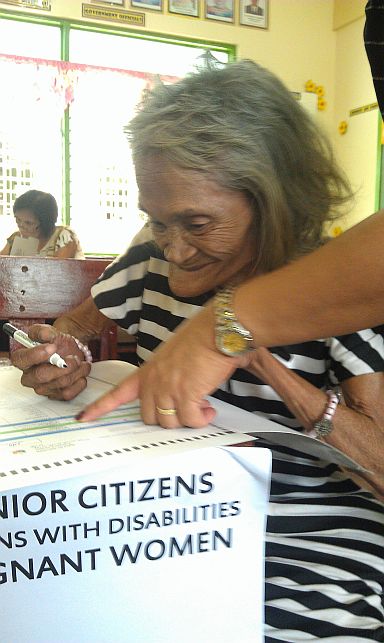
Erlinda Yangson, 73, of Barangay Don Andres Soriano, gets help in casting her vote. (CDNPHOTO/RENE F. ALIMA)
When 80-year-old Rosanna Rias arrived alone at Camputhaw Elementary School where she is a registered voter, she was not expecting to climb up to the third floor where her precinct was.
“Wa ko kasabot ngano naa mi sa taas nga tiguwang na man unta mi ug klaro na man kaayo nga di na ni namo makaya (I don’t understand why they put us upstairs when we are already old and it is clear that we can not go up the stairs),” she said after casting her vote.
Rias had to ask other voters to assist her to in getting to Cluster 147 on the third floor.
She was not alone in this challenge.
Lean Mendrez, 39, is blind. As his precinct is in Cluster 343, he was supposed to go up to the second floor to vote.
He lamented how it was difficult for him to go up to the second floor, but with the help of other voters, he managed to reach his destination.
Michael Angelo Sarno, Commission on Elections (Comelec) Cebu City north district election officer, said this should not have been the case.
“This is why we have Emergency Accessible Polling Places (EAPP) for our senior citizens and PWDs,” said Sarno.
Located on the first floor of every voting center, the EAPP is designed for senior citizens, persons with disability (PWDs), pregnant women and voters who suffer from health problems.
Each voting center is required to have an EAPP per Comelec Resolution 10108 promulgated last April 29, 2016.
Sarno said, however, that because EAPPs need early registration for access, there are hundreds of PWDs and senior citizens who were not registered because they were not aware.
“This could be why their precinct numbers are still in the higher floors and not in the EAPP,” Sarno added.
He said those who want to use the EAPP could easily sign a waiver that permits a member of the Board of Election Inspectors (BEIs) in the EAPP to pick their ballot up from their respective precincts and bring it down to them so they could cast their votes.
Afterward, the BEI would have to bring the ballot back up to the precinct and feed it to the vote-counting machine (VCM) there.
John Paul Maunes, one of the proponents of Fully Abled Nation (FAN), a movement to involve PWDs more in the electoral process, said this was not the case in all polling centers.
“Some BEIs in polling centers did not allow the ballots to be taken out of their precincts. In the end, there were people who fainted because of the heat and the exhaustion,” said Maunes.
Sarno said that because the EAPP system is relatively new, they still have to work out the kinks so it would be more effective in the next elections.
“This is a move by the Comelec to make the voting process easier for many of the disadvantaged Filipinos who can’t vote because of their physical disability. That should not be a hindrance to take part in the electoral process,” Sarno added.